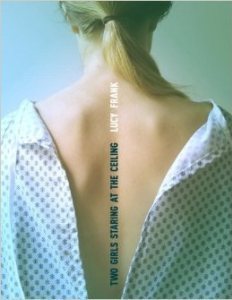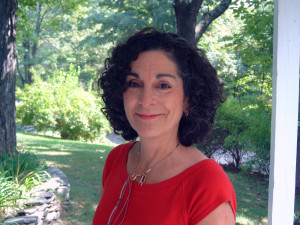National Poetry Month: Guest Post from Lucy Frank: Delighting In Words
Somewhere in the endless middle of writing TWO GIRLS STARING AT THE CEILING, I was taking a walk on our dirt road in upstate New York when the sky went dark and the wind began to blow. As I got to the top of the huge open field we call Harry’s Hill, thunder rumbled, first in the distance, then closer. As drops began to fall, and lightning lit the sky, the thought came: I could go stand in the middle of the field. If I’m struck down by lightning, I won’t have to write the book.

Schwartz & Wade, August 2014.
TWO GIRLS is a novel in verse about two young women whose lives are upended by chronic illness. It takes place in a hospital room. I gave the girls the same disease I’ve had since I was nineteen, Crohn’s, a sometimes terrible disease no one wants to have and no one wants to talk about. It’s also called Inflammatory Bowel Disease. No surprise no one wants to talk about it.
Exactly, insisted the same voice that voted for the lightning solution. You spent so much of your life trying to deny you have the thing. Now you’re going to spend how many years wallowing in the experience? Why would anyone want to read that book? Why would anyone want to write it? And what gave you the grandiose idea of writing it in poems?
I’ve always read poetry. But I never thought of myself as a poet. I still don’t, really. I think of myself as someone who delights in words: the feel of the vowels in my mouth, the music, or the playful silliness in the sounds. I love to fuss and fiddle with them, mess around. The surprise of a pleasing cadence, a sly rhyme, the exact right word gives me the same sharp joy as coming upon a salamander in the spring woods, or hearing a woodcock’s crazy, buzzing mating call.
Both are joys I learned from, and shared, with my father, who loved the natural world and wrote poems of wit and grace, almost always in form. But from him I also learned to use words as indirection, smoke screen, obfuscation. Or, to use a word I’ve always enjoyed but never used: persiflage. In life, my father kept his feelings tightly wrapped. In his poems, he danced around them, dressed them in elegant or humorous disguise.
That was what I assumed I’d be doing when I first thought of writing the poems that morphed into the book. I saw a notice asking for original poems or stories for a new online magazine for teens living with chronic illness. I’d hit a bump in the novel I was working on, so I thought, I can do that. It’ll be a nice diversion. Within a few days I’d written a poem I called “After Seeing the Gastroenterologist.”
How ’bout a dog next time, instead of a doc?
With eyes that never tire of watching me,
ears utterly attuned,
an infectious doggy smile.
Who cares if he doesn’t smell that great
or take insurance, can’t write prescriptions,
do a colonoscopy, or save my life,
if it should come to that?
With a wag of welcome,
he’ll pad over, and after a polite sniff,
tuck his nose into my armpit
to check my temp,
Then clamber up beside me
and turn around three times
before, with a calm so total
it’s contagious, he settles in for our consult.
Poem after poem bubbled up, all well within my father’s comfort zone, even this rewrite of the side effects list in the brochure accompanying my most dreaded med:
A is for acne;
B, for buffalo hump, bald, bloated, beard;
C is cuckoo, cataracts;
D, deranged, depressed;
E, if it can’t run away, I’ll eat it;
F, I’m frantic, frazzled, frightened of getting fat.
But then there’s G,
for gets you better,
and that shining H. For hope.
The problem is,
what if I go straight to R, for ripshit,
before the steroids help?
Then I wrote something that surprised and scared me:
And suddenly
everything you thought you knew
you don’t. You’ve stepped off
the edge of your life
into
Sickland.
In an interview in Marin Magazine (November 2014), the wonderful poet Jane Hirshfield said: “Poems hover between inner and outer worlds. They’re messages holding the kinds of thinking and feeling we’re often too shy to speak aloud. The most powerful moments of our lives cry out for the deepening and acknowledgment that hard-to-find words can bring them. . . . They enlarge the range of what you can see and feel.”
When, shortly after writing “Sickland,” the lines came to me:
Sometimes I wish I could be just me
without my body
I’d found the message, to use Jane Hirshfield’s word, I didn’t know I’d been seeking.
In another interview, this one on NPR a few weeks ago, about her new book, TEN WINDOWS: How Great Poems Transform the World, Hirshfield spoke about compassion, and how poems “ . . . allow us to feel how shared our fates are. . . . Someone else has been here. Someone else has felt what I felt.”
My own poems kept coming. And with them, good girl Chess, and profane, pissed-off Shannon. Putting my lines in the voices of characters who were not me, or only parts of me, and giving them a story that is not my story, even if we share an illness, let me dare to get started. The poems gave me the freedom to jump from present to past, and between the inner and outer worlds. But mostly, the poems helped let me stick with a story — my story, however well-disguised — that felt too dangerous to look at too closely, or feel too deeply.
Hirshfield again: “Finding a poem is what lets me find a way through what feels like an impenetrable thicket. Poems are answers to the questions that can’t be answered.”
In the case of my two girls, and myself: How do you dare show yourself to the world and to yourself? How do you trust that people will see you for who you are inside, when you can’t trust your body not to betray or embarrass or shame you? How can you live your life when you’re never sure how you’ll feel? What do you do with the anger and discouragement? How do you ask for help when you need it, and still hang onto your pride? How do you keep on laughing? How can you remember, when things feel really bad, that it won’t stay that way, and that life will be happy again?
The compassion I found for my girls was what kept me writing. But we’re all of us caught in one thicket or another. I hope everyone who reads TWO GIRLS STARING AT THE CEILING will see something of herself or himself or someone she knows in Chess and Shannon and the people in their lives.

Lucy Frank.
Lucy Frank is the author of eight young adult and middle grade novels. Her first, I AM AN ARTICHOKE was a 1995 Publishers Weekly Flying Start. TWO GIRLS STARING AT THE CEILING received the 2011 PEN/Phyllis Naylor Working Writer Fellowship. It has been named a 2014 Best Teen Realism and Best Teen Friendship book by Kirkus Reviews and cited for outstanding merit on Bank Street College of Education’s Best Children’s Books of the Year. She and her husband split their time between New York City and their home in upstate New York.








